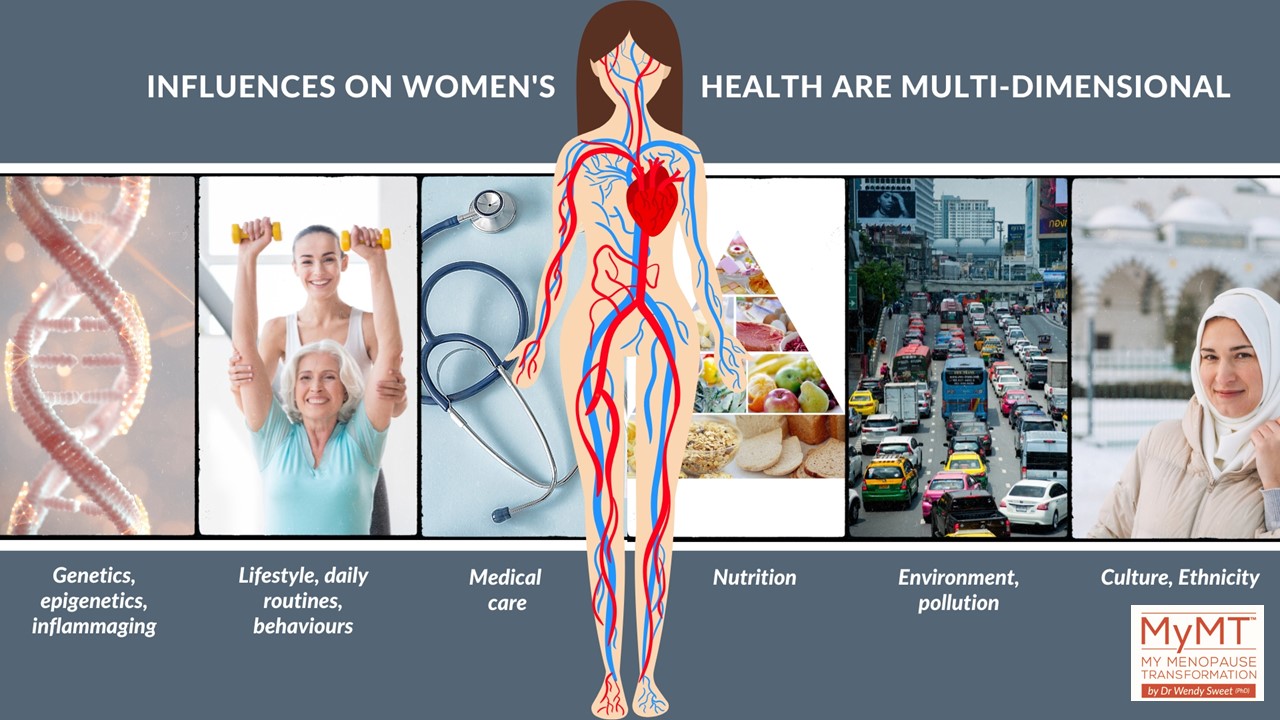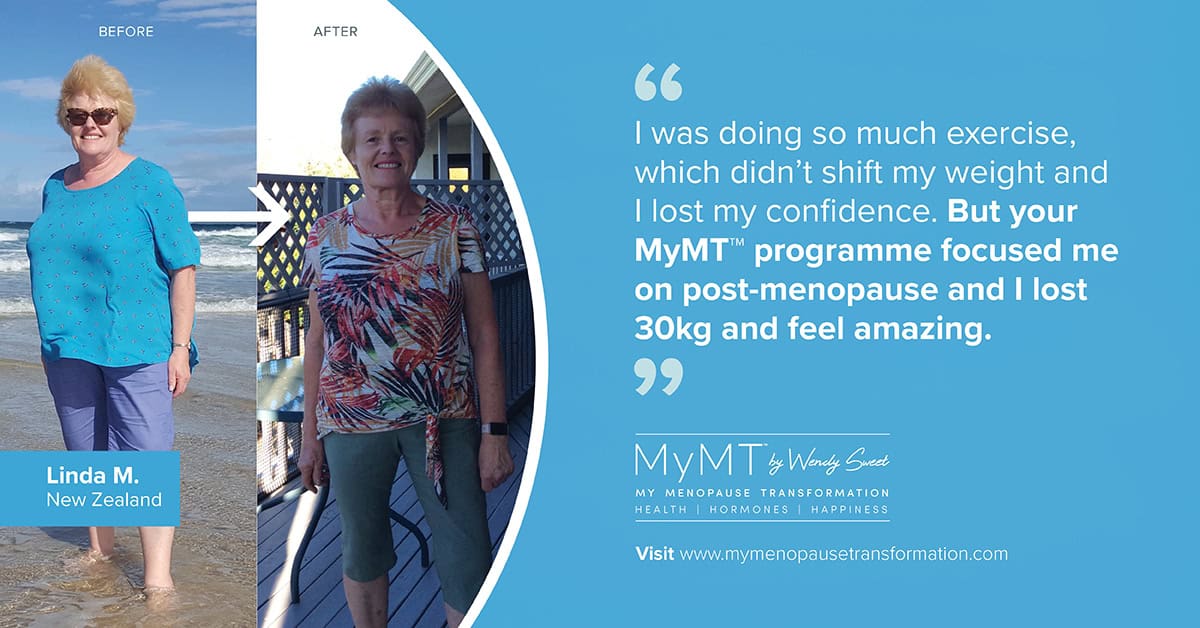When I was lecturing in health and wellbeing at Waikato University many years ago, I used to show students the diagram below depicting the World Health Organisation’s dimensions of health and the known consequences.
Never once did I think it applied to me. I was a regular exerciser, I (supposedly) ate ‘well’, I was pretty motivated and I thought I was a good representative of being ‘healthy’.
But that was before menopause hit. And before I had my blood work done to determine what was really going on with how ‘unhealthy’ I was feeling. Insomnia, exhaustion, weight gain, mood swings and mobility concerns distracted me from doing the work that I loved to do, which was educating and motivating others to be ‘healthy’.
The blood work was the ‘wake-up’ call that I needed – at the time my liver functions were high, Vitamin D and iron were low, cholesterol was high and goodness knows what my inflammatory marker (C-reactive Protein) was doing, because I didn’t know about that then and nor apparently, did my Doctor.
All I knew was that I couldn’t go on each day feeling the way I felt. Something had to change and the first ‘change’ I had to make, was asking myself, how on earth I had gotten to this point with my ‘health’?
That’s when I began to go back to the books and explore the W.H.O. Dimensions of Health. I was studying these at the time of my Masters degree and then returned to it during my PhD.
You see, the women whom I was interviewing at the time, had all positioned their ‘healthy ageing’ in doing lots of vigorous exercise. But when I enquired how this was going for them, not one of them felt ‘healthy’.
They just trusted that their exercise specialists were giving them the correct information about the exercise and nutrition they should be following in their 50s, to move into their older years in the best health possible.
This week is Women’s Health Week. So, with my passion and purpose centred on the health and wellbeing of women transitioning menopause, I wanted to start with getting you to consider your ‘health’.
I know from numerous women on my programmes, many no longer feel healthy … despite trying to eat well, exercise and take all the various supplements that are marketed to us during this stage of life. I used to feel the same.
That’s why understanding the Dimensions of Health is a great starting point for you and these are depicted in the WHO diagram below.
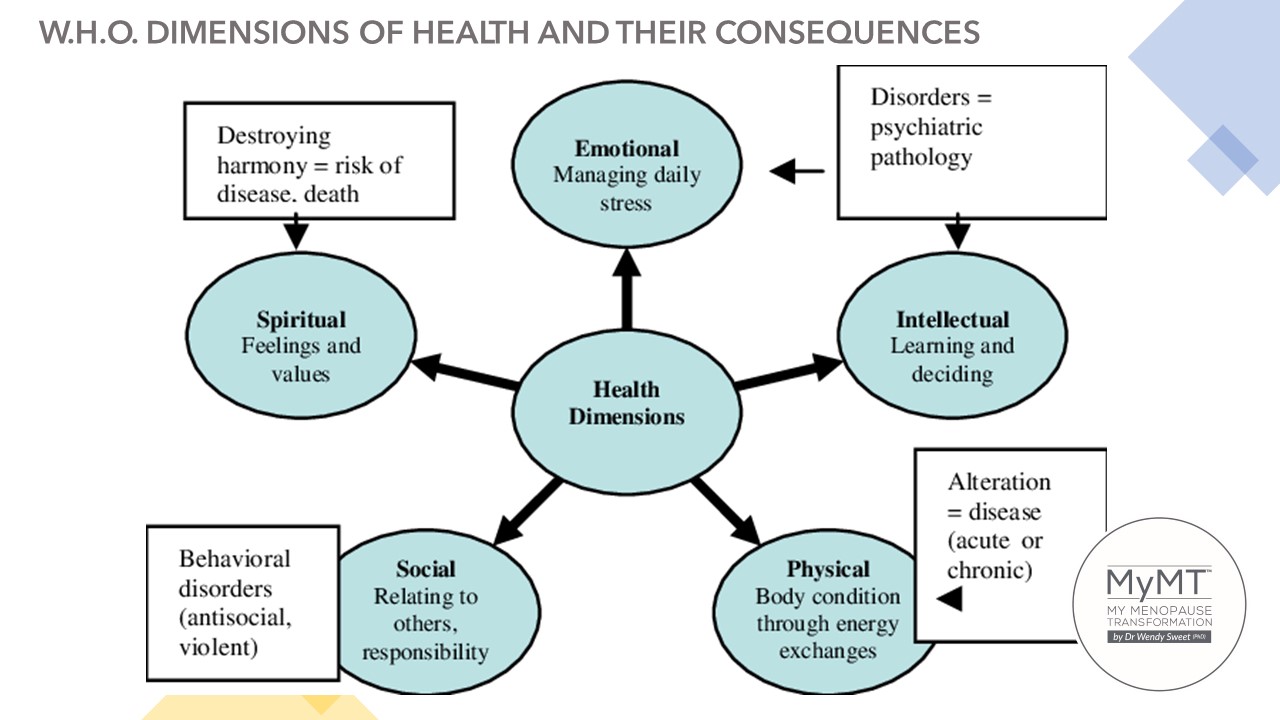
Over our lifetime, health researchers (mainly Psychologists) have tried to explain the health-disease relationship through various theories. Two main models exist today:
- The Biomedical Model. This is based on the direct cause/effect relationship which explains the occurrence of disease. Appropriate treatments are then able to be presented to patients.
- The Psycho-Behavioural Model. This is part of social-psychology learnings, and incorporates the attitudes and values of individuals and how these influence health-related behaviours.
Both of these theories help health promoters to move people towards ‘healthier behaviours’. The pandemic was a great example of how governments were using these theories to influence population health.
Understanding the various dimensions of health, enables us to examine ALL aspects of our personal health – which the W.H.O. define as ‘not merely the absence of disease or infirmity, but a state of physical, mental and social wellbeing. The physical dimension also contributes to emotional, intellectual, social and spiritual dimensions.’
Therefore, in order to be considered “healthy,” it is imperative for none of these areas to be neglected.
Optimizing all these determinants of health contribute to a state of balance and harmony both within ourselves and with the world around us.
If we are going to feel healthy as we move through menopause and into post-menopause, then one of the main imperatives is that, if we are feeling unhealthy, then we change our behaviours and CREATE health promotion skills.
This enables (and hopefully empowers us), to keep moving towards, not only the control of our own health, but for those of you who have family to care for, or you are in leadership roles at work, then health promotion is about taking these skills into the environments you are in.
Health promotion is also about putting your own health needs first.
Feeling unhealthy means making the changes that you need to do, in order to have greater energy to live your best life. Afterall, in menopause, we are over halfway through our life – hence, if what you are doing isn’t working for you, some changes are necessary. It’s why I have such on focus in my programmes, not only on ‘what to change’, but also ‘how to change’ based on my 7 Pillars of Women’s Health in Menopause, which I talk about in my Masterclass on Menopause as well.
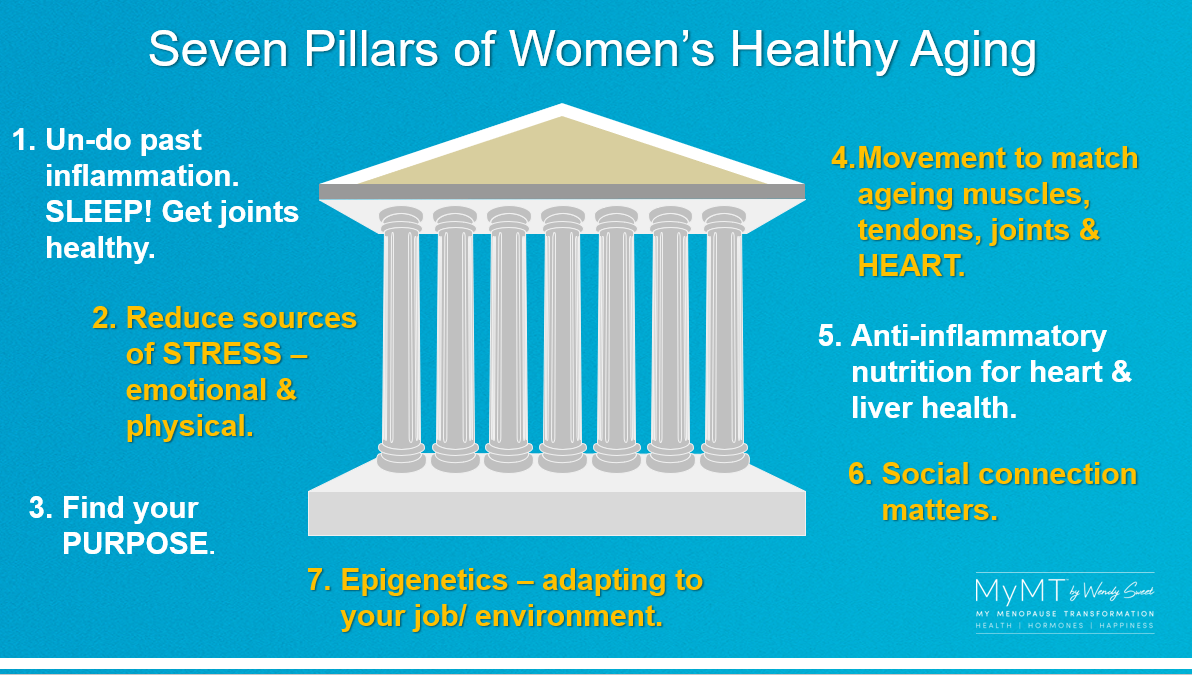
The rapid growth of Health Coaches globally is a wonderful addition to support networks for women’s health.
Many are Nutritionists and/or PT’s who are focused on supporting the health and wellbeing of others, so it’s important that they take a broader approach to health discussions and not just focus on exercise or food.
Just as menopause is primarily viewed as being ‘only’ about hot flushes, or seen in the medical paradigm as requiring pharmaceutical treatments (nothing wrong with this either), when and how, are all the other DIMENSIONS of HEALTH being accommodated?
Over the past week, I’ve been sharing the numerous dimensions of health with the thousands of women in my coaching community as part of Healthy Ageing week with MyMT™ as well as with organisations I’ve been presenting too.
One of my messages is that good health starts from the inside-out (emotionally, spiritually and physically).
When we explore the various dimensions of health, there is so much more to this than ‘just food’ or ‘just exercise’. Perhaps you can reflect on what’s going on in your life and how you might be able to make small changes that move you towards managing all these dimensions comprising your health?
I had to do this too. Re-imagining aspects of my own health and how to untangle it, started with reflecting on ‘what isn’t working?’.
As such I got rid of the exhausting high-intensity activity, stopped listening to dietary advice that took a ‘one-size-fits-all’ approach and therefore, wasn’t situated or evidenced for menopausal mid-life women. I also began to better manage my stress levels and put my Masters research on health behaviour-change into action.
That’s why, as part of celebrating Women’s Health Week, I want to share some practical things that you can do to begin your renewed health journey:
- Start from the inside-out with your thinking. As I mention in my Masterclass on Menopause, menopause chaos is invisible. Therefore, get bloods done when you can and get some baseline results. The ones I suggest that affect our symptoms and our ageing are: Vitamin D, Iron, Ferritin (stored iron), C-reactive Protein (an inflammatory marker); Liver Function; Cardiac Function and of course, Thyroid Function. Don’t worry too much about hormones – all they do is tell you if you are in menopause or not and remember that those of you on HRT, may have a false reading about your true menopause status if you get your reproductive hormones tested.
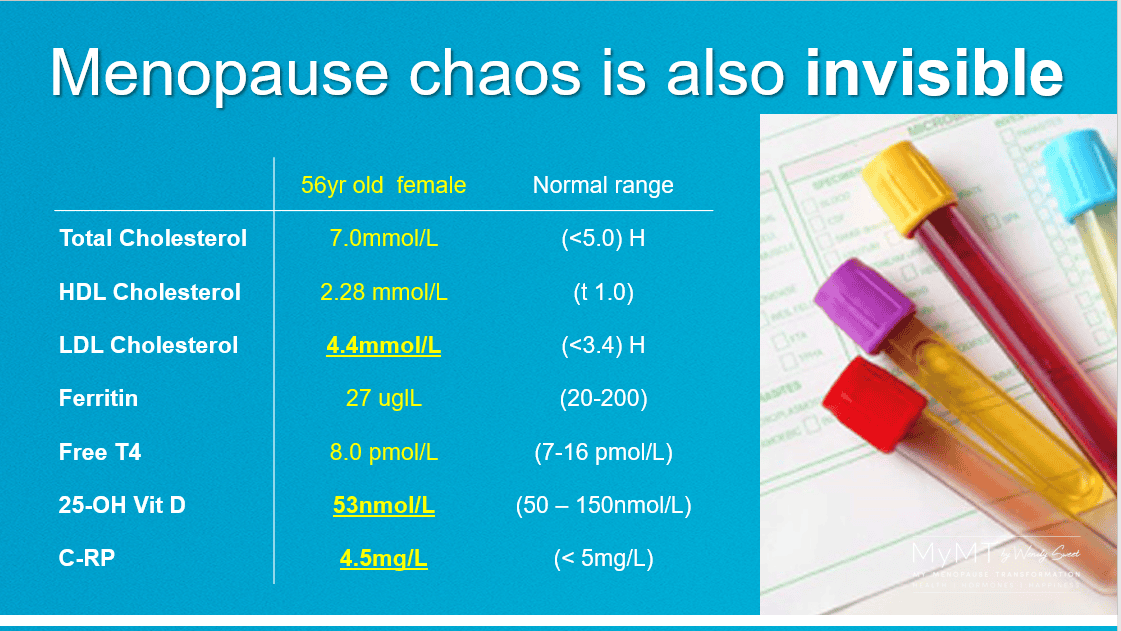
- Choose one or two things to reflect on based on the dimensions of health criteria. For some of you it will be physical, but for others it might be spiritual or relational. I think we all know by now how our levels of stress influence our moods, coping, and of course our eating and exercise habits. So dig deep. Go to that self-reflection place that you haven’t been for years. Go for a walk and ‘reflect’. Only when we go-deeper into our true selves do we start to (re) discover our true self. Where is she and how has she been hidden over the years?
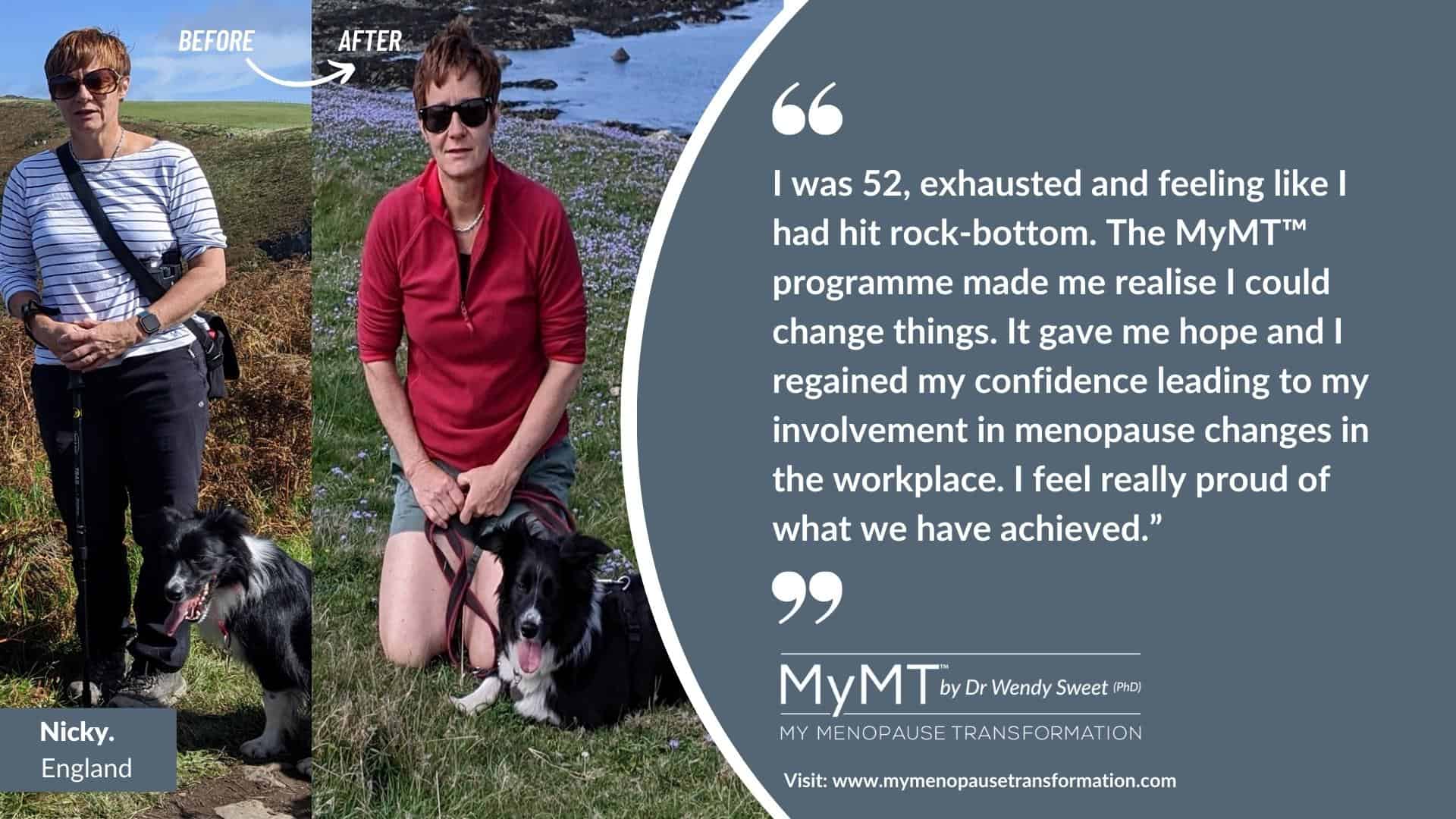
- Bring others along for the ride. What about your family, friends, work-colleagues? I love how workplaces are opening up conversations on menopause. It’s about time isn’t it? One of the UK ladies in my group, Nicky (in the banner above), was brave enough to bring the conversation about menopause into her workplace and this has taken her on a journey within her company to bring this fabulous topic to the attention of others. As she mentioned,
“I reached out to women in our leadership team to begin with and had a great response.
They have invited me to join the Inclusion Diversity and Belonging forums they hold to discuss setting up menopause workshops, but also to start to get some open conversations going. I have also been invited to join our “inspiring people ” steering committee where new policies are discussed.
Go Nicky!
And then there is Claire from the UK and her role as a Clinical Psychologist with the NHS. She, more than anyone, understands the magnitude of stress in the workplace and the impact of this on our symptoms and of course, our confidence and wellbeing. It’s something she really had to work on herself as NHS employess have faced extraordinary stress since the pandemic.
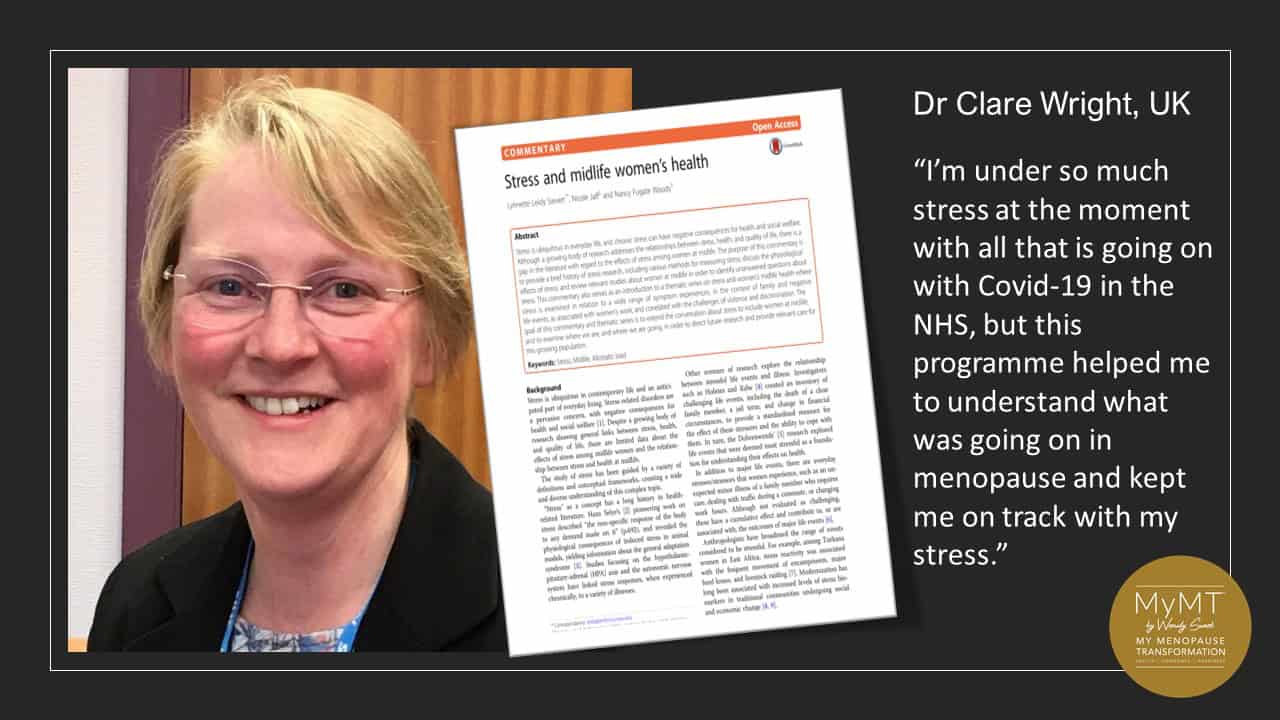
With this week being Women’s Health Week, I hope that you can make the time to hide away and start on your renewed health and wellbeing journey.
Perhaps start by listening to my Masterclass on Menopause if you haven’t been able to do this yet. It’s a great place to start in order to understand why your symptoms and health during menopause are changing and why menopause isn’t ‘just’ about hot flushes.
Dr Wendy Sweet (PhD)/ MyMT™ Founder and Member: Australasian Society of Lifestyle Medicine.
